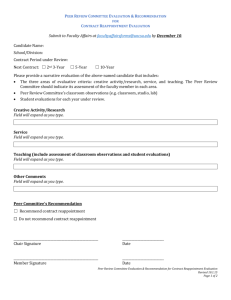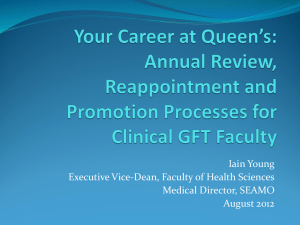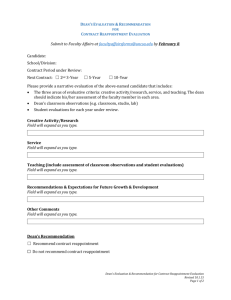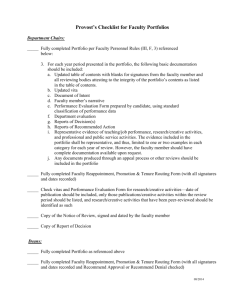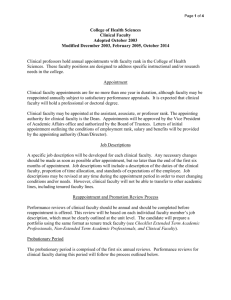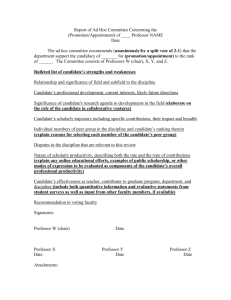college of administrative science
advertisement
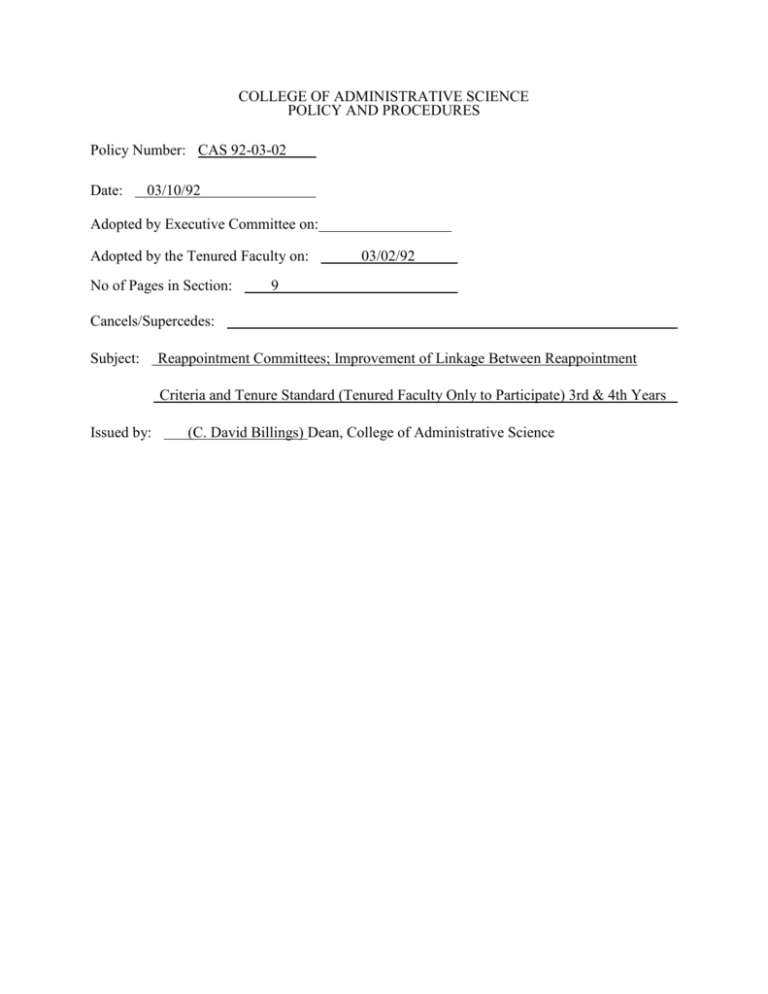
COLLEGE OF ADMINISTRATIVE SCIENCE POLICY AND PROCEDURES Policy Number: CAS 92-03-02 Date: 03/10/92 Adopted by Executive Committee on: Adopted by the Tenured Faculty on: No of Pages in Section: 03/02/92 9 Cancels/Supercedes: Subject: Reappointment Committees; Improvement of Linkage Between Reappointment Criteria and Tenure Standard (Tenured Faculty Only to Participate) 3rd & 4th Years Issued by: (C. David Billings) Dean, College of Administrative Science January 4, 1993 Ref 92-159 TO: Faculty, College of Administrative Science RE: Reappointment and Tenure linkage Based on discussions I have had over the last two years with the Provost, the Department Chairs, the College's Promotion and Tenure Advisory Committees, and the College's faculty, I believe we can enhance the linkage between the College's Reappointment and Tenure Standards. I discussed the College's Reappointment and Tenure Standards in the March 23, 1992 (Ref 91-232) memo to the faculty. At this time I want to provide additional guidance to tenure-earning faculty as they set priorities which develop their careers, to tenured faculty as they serve as mentors, and to department chairs as they work with the candidates to complete comprehensive files and before the chairs charge the reappointment committees. The key idea throughout is to emphasize quality. Here, then, are my ideas on how the tenured faculty, chairs, and I should proceed to enhance the linkage between the College's Reappointment and Tenure Standards. The linkage between the College's Reappointment and Tenure Standards is based on the responsibility of the reappointment committee members, the department chairs and the dean to provide the reappointment candidate with faculty development guidance which is related to the University's tenure standard. Tenure recommendations from the College are reviewed by the University Review Board, the Provost and the President. For information on the University's tenure standard, refer to the Faculty Handbook. Additional materials applicable to this College's reappointment and tenure standards are identified in the references at the end of this memo. If you would like to have a copy of any of the references, just ask Mrs. Ellen Harris for it. Application of the Linkage Reappointment committees will consist of tenured faculty in accordance with the College's policy developed March 2, 1992. Having tenured faculty members serve on reappointment committees should strengthen the linkage between the reappointment review process and the tenure review process. Having guidance from four tenured faculty should increase the quality of the feedback from the reappointment committee on ways each candidate can improve performance in teaching, research, and service Page 2 Ref 92-159 including professional activities and collegiality. This feedback will assist the candidate in determining in a timely manner what progress is needed in each area prior to the tenure review. The objective is to provide a clear message to tenure-earning faculty on their progress toward the desired results from year to year; that is, outcomes which are consistent with the College's mission and which are likely to help them achieve tenure. This approach should reduce the ambiguity of the tenure criteria and inform the candidates about the tenure standard in ample time to respond. My perspective on the linkage between reappointment and tenure standards is as follows. The reappointment review during the first and second years should focus primarily on teaching performance and secondarily on research performance. As the teaching performance is established over time, the focus should shift primarily to research performance. The third and fourth year reappointment reviews should be intensive pre-tenure reviews. All criteria--teaching, research, and service including collegiality--should be examined in the same detail as at the tenure decision. The most important criterion in these reviews is evidence of substantial growth and future promise. While it would not be expected that the candidate for reappointment being reviewed in the third and fourth years would have achieved the stature required for the award of tenure, there should be convincing evidence that the candidate has the potential to achieve the criteria for tenure and for promotion to associate professor at UAH by the fall of the sixth year. The reappointment review of teaching should examine subject matter expertise in the courses taught, instructional design skills, and instructional delivery skills. Colleagues are particularly able to evaluate these instructional elements. Students provide useful evaluations of the course and the faculty member's teaching skills. According to L. A. Braskamp, Dale C. Brandenburg and John C. Ory (refer to Evaluating Teaching Effectiveness, Sage Publications, 1984), assessments of teaching materials should be developed in three major areas: course organization, assignments, and exams and grading. In course organization, the review should include an evaluation of the course content, the syllabus vis-a-vis the master syllabus, course objectives, the sequence of topics, the appropriateness of the difficulty level for the students, the inclusion of recent developments in the field, the relationship of the course to its prerequisite and the relationship of the course as a prerequisite for other courses. Page 3 Ref 92-159 In assignments, the review should include an evaluation of the appropriateness of the text, the reading list, the homework, the use of the library, the writing assignment, projects and computer applications. With regard to exams and grading, the review should include an evaluation of the exam content, the grading of exams, and the appropriateness of the grade distribution. Student achievement in more advanced courses is also relevant. Student evaluations which are cumulative over several years and from a range of courses provide a more accurate presentation of student views for a tenure decision than ratings from a single class. For a personnel decision, an overall rating is more appropriate than diagnostic ratings. For mentoring to improve performance, diagnostic ratings are appropriate. Based on Dr. Stafford's comments about the University Review Board's evaluation of teaching performance, we should be concerned with teaching performance when student evaluations scored on Item 20 are below 3.50. The 3.50 rating is approximately one standard deviation below the College's mean. To document the teaching program, the reappointment file should include course syllabi, course examinations, course grade sheets, a record of student evaluations via Item 20, and other indications of interest in teaching and teacher-student rapport. Other factors also may be appropriate to consider when evaluating a faculty member's performance in teaching. For more guidance on preparing the teaching portfolio, refer to Peter Seldin, The Teaching Portfolio, Bolton, MA: Anker Publishing Co., 1991. The reappointment review process should provide the candidate with timely guidance on faculty development needs in the teaching area during first and second year reviews. Tenured faculty should mentor tenure-earning faculty in the development and improvement of teaching skills. Therefore, after the third year, the quality of teaching should not be in question. If the candidate does not meet or exceed College expectations at the time of the third year review, a non-reappointment decision is warranted. The reappointment review of research should examine the quality and quantity of the candidate's research program. The tenure-earning faculty member should produce research contributions on a continuing basis. By the third and fourth years, the candidate's research program should have produced manuscripts of sufficient quality to indicate the potential for future quality, quantity, and continuity of a research agenda. Evaluation of research should focus on significant peer reviewed publications. Colleagues are particularly able to evaluate research output. Colleagues should use national standards when evaluating research output and mentoring tenure-earning faculty. Page 4 Ref 92-159 As part of the tenure review, external reviews are helpful sources of information on a candidate's research in terms of its significance, quality and overall contribution to the field. Individuals selected as external reviewers should normally be senior faculty at universities with AACSB accreditation. In preparing the candidate's tenure dossier, the department chair, in consultation with the candidate and the dean, shall seek external professional evaluations of the candidate's research output. This review of research also should consider the stage of the candidate's career development. These considerations should include the following: If the candidate came to UAH with all requirements for the Ph.D. completed but the dissertation, then the candidate usually should complete the Ph.D. within one academic year. Some downward adjustment in the research agenda's expected output by the third year at UAH would be warranted in comparison to a candidate who started at UAH as a new doctorate. But the candidate should complete this adjustment prior to the sixth year. A fifth year peer review could be helpful for candidates in this category. If the candidate came to UAH with prior faculty experience, then it would be appropriate to consider the length of experience and the nature of the university. Some upward adjustment in the research agenda's expected output by the third year at UAH would be warranted in comparison to a candidate who started at UAH as a new doctorate. Tenured faculty should mentor the candidate in establishing a research program and setting priorities. Usually the new faculty member has just finished a Ph.D. program and has just completed dissertation research that created new knowledge. The new faculty member should try to develop one or more manuscripts from the dissertation research. Therefore, at the initial stage of career development the faculty member's skills are best applied to basic research. After the basic research program is established and the faculty member becomes familiar with the Huntsville business and government communities, then adding applied research opportunities might be appropriate. After a faculty member has firmly established the teaching and basic research credentials, research in instructional development might be appropriate. Consequently, the tenure-earning faculty member should establish priorities in research as follows: 1. Basic research: The creation of new knowledge. Outputs include publication in refereed academic journals and research text. Page 5 Ref 92-159 2. Applied research: The application, transfer and interpretation of knowledge to improve management or other professional practice and teaching. Outputs include publication in professional journals. 3. Instructional research: The enhancement of the educational value of instructional efforts of the university or discipline. Outputs include publication in pedagogical journals, textbooks, cases and instructional software. In evaluating research, quality and significance are more important than quantity. One test of quality is the quality of the journal in which the research is published. One test of research quality is its impact on the discipline. Journals which have an impact on the discipline are identified in the Social Science Citation Index and the Science Citation Index. In addition, another test of quality and significance is the acceptance rate and circulation, as published by Cabell's Directory of Publishing Opportunities in Business and Economics. Contributions through research and publications can take a number of different forms, but the following categories represent a sense of hierarchy of external peer- reviewed research: Refereed journal articles, Scholarly books, Scholarly monographs, Chapters in scholarly books, Textbooks, Chapters in textbooks, Research grants, e.g. National Science Foundation awards Papers published in proceedings of regional meetings, Book of readings, Cases, Study guides, Teaching manuals, and Book reviews. Page 6 Ref 92-159 To document the research program, the reappointment file should include the following manuscripts for the reappointment committee's review and evaluation: reprints of peer reviewed publications manuscripts accepted for publication manuscripts under revision manuscripts submitted for review, manuscripts in progress, and papers presented at professional meetings but not published in a proceedings. Other factors also may be appropriate to consider when evaluating a faculty member's performance in research. The reappointment review process each year should provide the candidate with timely guidance on faculty development needs in the research area. Tenured faculty should mentor tenure-earning faculty in the development of a research agenda and in providing constructive comments on research and manuscripts in progress. By the third year review, there should be an optimistic to very high probability of the research program producing the quality and quantity of publications needed to achieve promotion to associate professor at UAH by the sixth year. By the fourth year review, this probability should be extremely high. There should be convincing evidence the candidate is increasing research and publication activities. Otherwise, a non-reappointment decision is warranted. The reappointment review of service including collegiality should examine how well institutional service and professional activities are accomplished. Tenure-earning faculty should develop their ability to work cooperatively and effectively with colleagues, students and administrators in teaching, research and service activities which support the College's mission and goals. This is a time in the person's career to determine whether to develop the career in the university, industry or government; and, if in the university, whether or not UAH is a good fit. The candidate's performance should provide evidence of contributions to collegiality and positive cultural fit. The following factors should be considered in evaluating a faculty member's performance. Assistant professors should attend faculty meetings regularly, be present to advise students outside of class, be present to interact with colleagues in teaching, research and service activities, be prompt and accurate with reports, grades and similar activities, Page 7 Ref 92-159 attend committee meetings regularly, accept service assignments willingly, make a positive contribution to assigned committees, present papers at important regional, national or international conferences, and participate in professional activities. There should be convincing evidence that the candidate demonstrates: a shared responsibility to colleagues, a genuine interest in assisting colleagues, a rapport with colleagues including contributions toward assisting colleagues in their teaching, research and service activities, a professional and cooperative attitude in dealing with colleagues, students, and administrators, and a willingness and ability to work effectively with colleagues to support the College's mission and goals. The service dimension includes expectation that tenure-earning faculty will continue their own personal and professional development. Evidence includes active participation in department, College and University activities that are consistent with personal and College goals; membership in national and regional professional organizations; presentations at professional meetings which are published in proceedings, and activities which maintain professional certification. The reappointment review process should provide the candidate with timely guidance on faculty development needs in the service area. It is the tenured faculty's responsibility to minimize assignment of assistant professors to College and University committees. Tenured faculty should mentor tenure-earning faculty in the allocation of time to meaningful service activities in which their expertise will promote the mission and goals of the College and University. With each succeeding year's reappointment review, it becomes increasingly important for the faculty to ascertain whether or not the candidate's personal and professional goals support the College's mission and potential.n The candidate should have a commitment to the mission of a research university. The College should seek to retain those candidates who understand the foundation that research provides for effective University teaching and service, whose personal and professional goals support the College's management of technology mission and potential, and who meet the long-term staffing needs of the College. Page 8 Ref 92-159 The section in the application for reappointment concerning the candidate's self-evaluation should provide a candid self-appraisal and explanation as well as solid evidence of accomplishments and solid explanations for shortcomings. The selfassessment essay should cover classroom procedures, enthusiasm for teaching, knowledge of subject matter, stimulation of student learning, relations with students, research activities, research recognition, contribution to the department, work with colleagues and professional activities. The section in the application for reappointment concerning professional goals should identify in specific terms the candidate's goals, the plan to achieve each goal and any departmental funds needed to achieve the goals. This essay should set forth the direction for professional development and the specifics for outcomes assessment the next year. The candidate and the department chair should discuss these goals before the candidate reports them in the application for reappointment. The paragraph on teaching should list the anticipated courses to be taught the next year and which, if any, are new preparations. This section should identify any planned teaching innovations such as plans for the development of new courses, computer software to aid teaching, revision of existing courses, development of new instruction or evaluation methods, etc. This section should identify any anticipated non-credit programs. The paragraph on research should identify ongoing research projects, new research projects, anticipated submissions, anticipated presentations including dates, and anticipated research contract or grant applications. The service paragraph should identify anticipated committee participation, including level and position; for example, College's Undergraduate Program Advisory Committee, member; other University service, for example, departmental student organization, advisor; professional service, for example, professional program participation, paper presentation; and anticipated service contracts. Career Development Faculty contributions to the College vary with skills and interests. In this memo I have tried to describe a modal pattern of emphasis which is most likely to lead to a positive tenure decision. The key idea throughout is to emphasize quality. The primary emphasis during the first and second years should be placed on establishing competence in teaching. As the teaching performance is established and sustained, the primary emphasis should shift focus to establishing a productive pattern of research and publication in peer reviewed academic journals. Service contributions should focus on developing the ability to work cooperatively and effectively with colleagues, students Page 9 Ref 92-159 and administrators in teaching, research and service activities at the departmental and College level. A recommendation for the award of tenure will be based on an assessment of all three dimensions--teaching, research and service including collegiality. Particular emphasis will be placed on the evidence of substantial growth in quality outputs over time and future promise. Suggestions If you have questions, please discuss them with me. If you have suggestions on how to improve the linkage of the reappointment and tenure standards, please discuss them with me, your departmental chair, and with members of the College's Promotion and Tenure Advisory Committee. The membership consists of Dr. Dorla Evans Dr. Cindy Gramm Dr. James McCollum, chair Dr. Niles Schoening Dr. Bill Souder Dr. Fan Tseng, alternate Dr. Robert Zant, alternate. C. David Billings, Dean CDB/emh xc: Dr. Yost Page 10 Ref 92-159 REFERENCES 1. "Information for Reappointment Consideration" (February 1992) 2. College's memo on reappointment and tenure standards (March 23, 1992, Ref 91-232). 3. The College's 1988-89 PTAC Statement of Standards for Promotion and Tenure (January 26, 1989) 4. The College's 1991-92 PTAC Statement of Guidelines for Promotion and Tenure (September 22, 1992) 5. University Review Board's Standards 1990-91, Dr. Paul's oral report in Synopsis of Executive Committee Meeting (March 13, 1991) . 6. University Review Board's Activities 1991-92, Dr. Stafford's memo (April 2, 1992) 7. College's Tenured Faculty, Statement on the Importance of Maintaining a Collegial Environment (July 10, 1991) 8. College's Tenured Faculty, Reappointment Review Process (March 2, 1992) 9. Letter from Mr. Rieder on Reappointment Committee Composition, (March 23, 1992) March 10, 1992 Ref 91-270 MEMORANDUM TO: ADSC Faculty FROM: C. David Billings, Dean RE: Reappointment Committees Since 1986 the College has worked to improve the linkage between the reappointment criteria and the tenure standard. In another memo I will review the history of this relationship. This year the tenured faculty perceived the need to enhance the linkage, particularly with the third and fourth year reviews. The tenured faculty recommended to improve the linkage by having only tenured faculty participate in the reappointment review process. They believe having a reappointment committee of four tenured faculty should improve the quality of the feedback with reference to the tenure standard. They believe tenure-earning faculty cannot speak with authority concerning the tenure standard. Also, they believe tenure-earning faculty should not review other tenure-earning faculty nor be asked for evaluation which might compromise them or place them at risk. I have reviewed this recommendation with Provost Yost and he supports it. I have discussed the recommendation with the University's Counsel, Bob Rieder, and he finds it authorized under University policy. Therefore, I approve and will implement the tenured faculty's recommendations of March 2, 1992. A copy is attached. C. David Billings CDB/emh Attachment: March 2, 1992 Synopsis of Tenured Faculty Meeting cc: Dr. John Yost, Provost Mr. Robert Rieder, University Counsel ADSC Tenured Faculty Meeting Synopsis March 2, 1992, ASB 203 Attending: Drs. Billings, Bryson, Floyd, Paul, Porter, Schoening, Souder, Stafford, Titard, Tseng, and Zant Not Attending: Drs. McCollum (on sabbatical), Olsen, Sherman, and Wilhite (on leave) Dave Billings stated that since 1989-90 the faculty have expressed an increasingly strong belief that only tenured faculty members should participate in reviews of tenure-earning faculty. Therefore, the tenured faculty are meeting to discuss the reappointment review process. 1. Grover Porter stated that he thought the appointment of tenured faculty outside the discipline to reappointment committees, when tenure-earning faculty in the discipline were available, would be a violation of due process as specified in the Faculty Handbook. Discussion followed. Niles Schoening made the following motion: Tenure-earning assistant professors will not be appointed to reappointment committees. Bill Souder seconded. All were in favor except Grover Porter who abstained. 2. David Billings asked, "Should tenure-earning associate professors be appointed to reappointment committees?" Grover Porter said that he didn't agree that tenure-earning faculty should be excluded from reappointment committees, but if we were going to exclude tenure-earning assistant professors, we should exclude tenure-earning associate professors. Discussion followed. Niles Schoening seconded the motion to exclude tenure-earning associate professors from reappointment committees. The motion passed unanimously. 3. Niles Schoening made the following motion: Reappointment committees may include chairs for review of faculty members outside the chair's department. Ted Stafford seconded. The motion passed unanimously. 4. A discussion followed concerning the application of the previous motion to other administrative and joint appointments such as associate dean, assistant dean, center director, and contract principle investigator. Ted Stafford made the following motion: A faculty member in the College who also has an administrative appointment in the College may serve on a reappointment committee unless the faculty member has review authority over the candidate's reappointment committee's recommendation. Niles Schoening seconded the motion and the motion passed unanimously. 5. Dave Billings stated that we want to improve the guidance for faculty development from the reappointment committees and increase the linkage between the reappointment review process and the tenure review process. Also, Provost Yost has encouraged the faculty to conduct the third and fourth year reappointment reviews as pre-tenure reviews. Therefore, the tenured faculty should discuss improving feedback, increasing the linkage with the tenure standards and the reappointment criteria for the third and fourth year reviews. Ted Stafford reported that the University Review Board, in tenure cases, is looking at the quality of teaching and the quality of research. Dr. Stafford discussed extensively the University Review Board's expectations. Dr. Stafford emphasized that a College could have higher standards than the University Review Board, but not lower standards. During the discussion concerning the reappointment criteria to use in the third and fourth year reviews, the tenured faculty identified the following points: a. Teaching evaluations should meet or exceed the College's expectations by the third year. Student teaching evaluations of at least a composite score of 70 (which is a mean of 3.5 on all 20 questions) are of concern to the University Review Board. b. Research (1) Look for a research agenda by the third year. (2) Look for publications in the third year; the candidate only has two more years to meet the tenure standard. (3) Look for material in pipeline to journals. (4) The reappointment file should include actual manuscripts: reprints of publications accepted for publication under revision submitted for review working paper in progress c. Service Look for service: in the department; in the profession by attendance at meetings and presentation of papers; and professional activities. (2) Tenured faculty should try to minimize assignment of assistant professors to College and University committees. 6. Dave Billings read the tenure standard from the College's 1987-88 and 1988-89 Promotion and Tenure Advisory Committees (PTACs). The tenure standard includes an expectation of the candidate contributing toward collegiality within the College and the requirement for a consensus among colleagues of the candidate's positive cultural fit in this University setting. Dave Billings asked for a discussion of that standard. Discussion followed and included the following points: Collegiality and positive cultural fit is present when the candidate demonstrates: A shared responsibility to colleagues; A commitment to moving the College forward; Contributions towards assisting colleagues in teaching, research and service activities; Effective work with colleagues.
